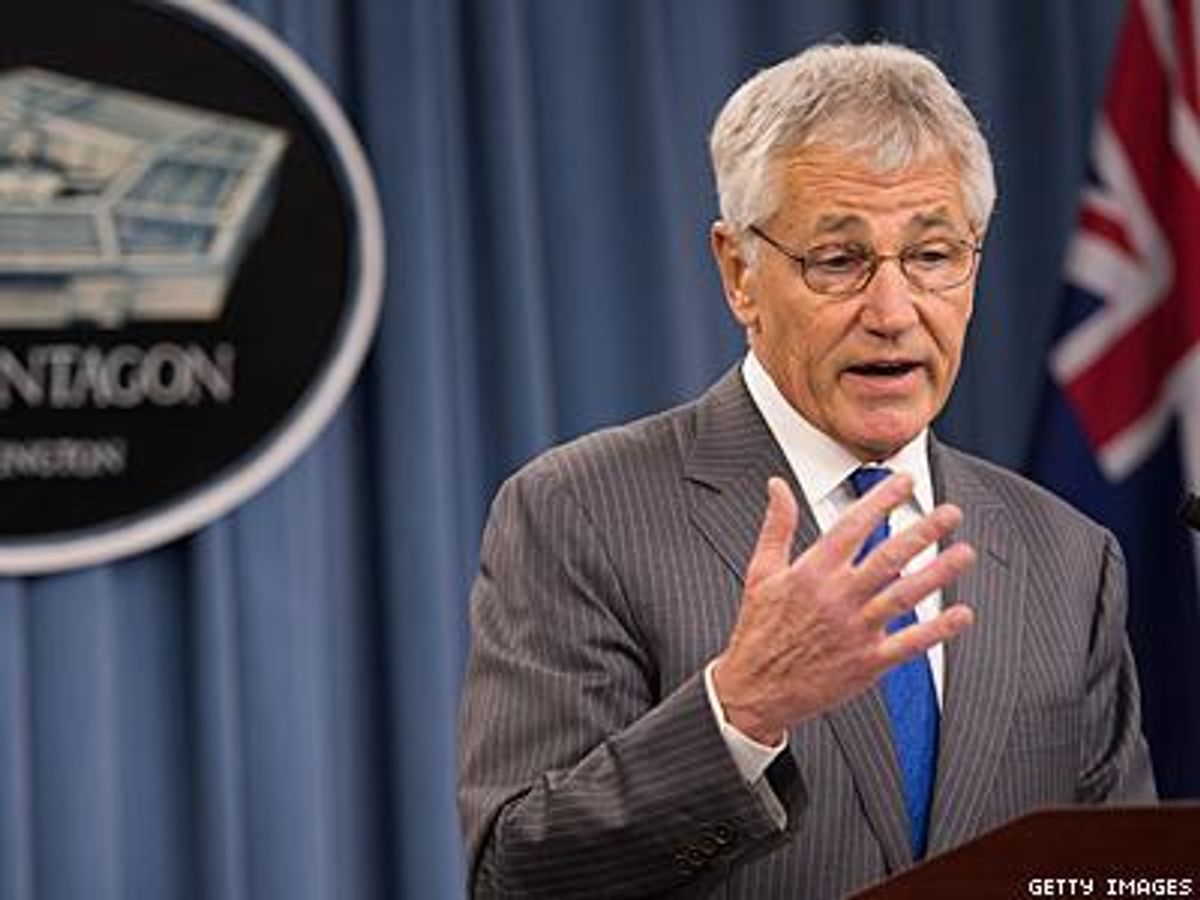The Pentagon Monday released an update to the Human Goals Charter for the Department of Defense, which for the first time explicitly mentions gay, lesbian, and bisexual service members, reports the Washington Blade's Chris Johnson. Notably, however, the document makes no reference to transgender people.
While the charter does not have any legal bearing, and doesn't directly impact department policy, it does outline the agency's human rights principles, citing a desire to "create a culture of inclusion" among servicemembers and civilian contractors. Mention of sexual orientation is included in the charter's instructions on how to attain the stated goals, as well as in its desire to be "a model of equal opportunity" in civilian and military employment.
"The defense of a nation requires a well-trained volunteered force comprised of active and reserve military members and civilian personnel," reads the document, according to an unsigned copy obtained by the Blade. "We gain a strategic advantage through the diversity of our total force and create a culture of inclusion where individuals are drawn to serve, are valued, and actively contribute to the overall mission success."
At a signing ceremony Monday afternoon at the Pentagon, Secretary of Defense Chuck Hagel applauded the military's forward movement around LGB inclusion since the 2011 repeal of "don't ask, don't tell."
"I'm proud that the language of the charter has been updated to reflect the contributions of gay and lesbian military personnel, who now serve openly and proudly across America's armed services," Hagel said, according to the Blade. "While there has been much progress made, all of us know there's still more work to be done. ... We must reinforce a culture of accountability, dignity, and respect across DOD and for all people. That is a top priority for all of us. Every person who serves our country in uniform has stepped forward with courage and commitment. Their patriotism, their willingness to serve their country, and their qualifications to do so, that's what matters. Nothing else."
But organizations working for the repeal of an outdated military medical regulation that bans transgender personnel from serving openly noted that the updated charter only represents one step in the march toward full LGBT inclusion in the nation's armed forces.
"While this is a positive step, it's very disappointing that the Department of Defense missed this opportunity to make clear its commitment to equal opportunity for transgender civilian workers," said Mara Keisling, executive director of the National Center for Transgender Equality, based in Washington, D.C. "Transgender civilian workers at the Department of Defense are protected under sex discrimination laws because [Equal Employment Opportunity Commission] precedent makes clear that sex discrimination law protects transgender workers in all federal civilian contexts including the Department of Defense. We hope the Department will make this explicit in its civilian EEO policy and will soon review the outdated rules, and remove the prejudice from those rules that prevent transgender service members from serving openly and safely."
Notably, the Pentagon's lack of inclusion comes just one day after The Washington Post ran a front page feature on Landon Wilson, a well-regarded member of the armed forces who had been serving in Afghanistan until he was discharged once his command learned that he is transgender.
Last month a Palm Center study made the case for transgender inclusion in the military, stating that there was no medical basis for the continued exclusion of transgender citizens. After the release of the Palm Center report, a Defense Department spokesman, Navy Lt. Cmdr. Nate Christensen, told the Associated Press there were "no plans to change the department's policy and regulations which do not allow transgender individuals to serve in the U.S. military."
Earlier today, Christensen reiterated those views in a statement to the Blade, defending the ban on trans service members and the exclusion of trans people in the new charter, contending that transgender people are already protected under the charter's prohibition on discrimination on the basis of sex.
"The Department considers that service members must serve in austere environments, many of which make necessary and ongoing treatments related to sex reassignment and many other conditions untenable," Christensen told the Blade. "Policies on military personnel and health care regarding transgender members are intended to meet the needs of the services, which include the ability to deploy to and serve in austere environments with limited -- and perhaps no -- access to medical care for prolonged periods on little or no notice."
Today's update to the Human Goals Charter is the first since the 2011 repeal of DADT.


















































































